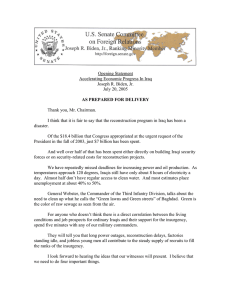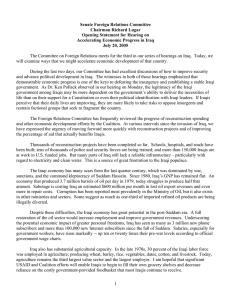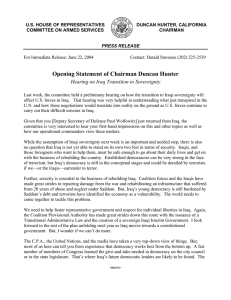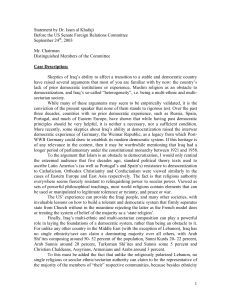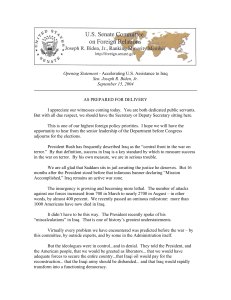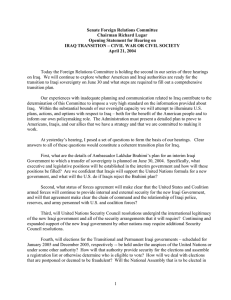Testimony for the Committee on Foreign Relations United States Senate
advertisement
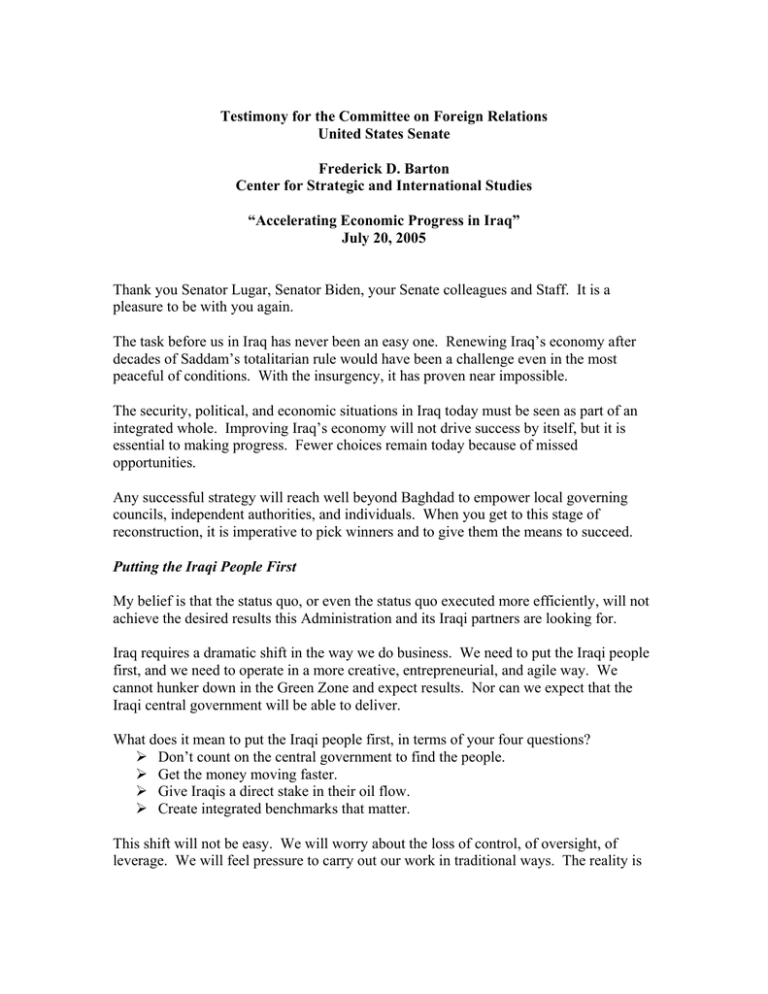
Testimony for the Committee on Foreign Relations United States Senate Frederick D. Barton Center for Strategic and International Studies “Accelerating Economic Progress in Iraq” July 20, 2005 Thank you Senator Lugar, Senator Biden, your Senate colleagues and Staff. It is a pleasure to be with you again. The task before us in Iraq has never been an easy one. Renewing Iraq’s economy after decades of Saddam’s totalitarian rule would have been a challenge even in the most peaceful of conditions. With the insurgency, it has proven near impossible. The security, political, and economic situations in Iraq today must be seen as part of an integrated whole. Improving Iraq’s economy will not drive success by itself, but it is essential to making progress. Fewer choices remain today because of missed opportunities. Any successful strategy will reach well beyond Baghdad to empower local governing councils, independent authorities, and individuals. When you get to this stage of reconstruction, it is imperative to pick winners and to give them the means to succeed. Putting the Iraqi People First My belief is that the status quo, or even the status quo executed more efficiently, will not achieve the desired results this Administration and its Iraqi partners are looking for. Iraq requires a dramatic shift in the way we do business. We need to put the Iraqi people first, and we need to operate in a more creative, entrepreneurial, and agile way. We cannot hunker down in the Green Zone and expect results. Nor can we expect that the Iraqi central government will be able to deliver. What does it mean to put the Iraqi people first, in terms of your four questions? ¾ Don’t count on the central government to find the people. ¾ Get the money moving faster. ¾ Give Iraqis a direct stake in their oil flow. ¾ Create integrated benchmarks that matter. This shift will not be easy. We will worry about the loss of control, of oversight, of leverage. We will feel pressure to carry out our work in traditional ways. The reality is that success in post-conflict reconstruction depends on more than stamping our name on a list of projects completed, goods delivered, or elections successfully run. Post-conflict reconstruction must not be ideological or utopian or build off the grandiose concept of “nation-building.” Rather, it must offer a pragmatic view that engages local people and encourages the expansion of their basic rights and freedoms. My belief is that employing such a strategy will be as important to defeating the insurgency as training the Iraqi army. OPTION 1: Don’t count on the central government to find the people. Development cannot stall in the central ministries or stop at Baghdad’s city limits. The key challenge in Iraq today is making sure reconstruction funds find the people. Some reports have it that 60% of the $18 billion in reconstruction funds the United States pledged to disburse by the end of 2004 have not yet reached Iraqis. There is a constant tension in post-conflict reconstruction between meeting immediate interests and needs and building long-term capacity. We should work to strengthen and support the Iraqi government, but we must recognize that not everyone in it will be able to escape static models of the past or eschew corruption. We must do an end-run around those who do not share our urgency and principles. The inefficiencies of the central ministries are a big part of the problem in Iraq today. The CPA’s overemphasis on the ministries from the beginning was unrealistic and poorly executed. The current climate in Baghdad encourages large-scale corruption. Too little of this money ever finds its way outside of the capital. To ensure that reconstruction resources get outside the capital and into the hands of ordinary Iraqis, we need to pick winners rather than go through traditional channels, and we need to make sure resources are distributed in an open and transparent way. Less should be planned through central ministries, and more should flow through reliable Iraqi partners in government and civil society. One available efficiency is to cut out middlemen and move business in to Iraq. Basra, for instance, could serve as a hub for goods now moving through Kuwait. Its airport is working at under 10% capacity, and its two ports at less than 50%. Transforming Basra into a hub for Iraq will require a greater investment in both security and management, but it is possible, and should be tried. Baghdad’s role should be to establish a national economic vision that captures the public’s imagination. This has not happened yet. As I will detail later in my testimony, I believe this could be centered on a national wealth-sharing plan for oil revenues. The insurgency will make getting beyond Baghdad difficult, but the more that we can channel aid in a decentralized, grassroots fashion, the more diffused our presence will be throughout Iraqi society, the greater the number of Iraqis will be involved, and the smaller, more agile a target we will provide to those wishing to do us harm. OPTION 2: Get the money moving faster. Creating jobs is an important element of post-conflict reconstruction. Jobs get potential insurgents off the streets and put money into the hands of Iraqi families. My belief, however, is that a WPA-style jobs program is unlikely to instill Iraqis with any real hope for the future or stake in the reconstruction effort. Such programs tend to pay low wages, employ people in menial tasks, and engage them for only short periods of time. Jobcreation may serve as a stopgap measure, but a more far-reaching strategy is needed. Micro-credit, small grants, and loans disbursed on the local level are a far better option. What we need is to build a network of several thousand distributors who can help channel money into their communities where it is needed most. Local governing councils, civil society organizations, or women’s groups that have a presence on the ground could help to implement these programs. It’s been done successfully in equally tough places as Iraq. The Iraqi government will not be able to move these funds fast enough into the communities. Our own funding methods must be faster and more flexible. Emergency response funds are a key component of such a strategy, but the U.S. military must not be the only outlet. Right now the U.S. military controls 70% of the $18 billion Iraq Relief and Reconstruction Fund. We should broaden the number of local actors who have access to emergency funds. Programs that can demonstrate an Iraqi contribution should be prioritized. One of the largest carry-overs of the pre-war period is the food basket that is provided to all Iraqis. It has been estimated to cost up to $18 billion per year, and is used for the centralized purchase of basic commodities, for distribution networks, and for other expenses. Iraqis would rather have the cash and make their own decisions on how to use it. Putting the money in their hands would generate more consumer power, accelerate money flows, and reduce the influence of the old state-centered model. The direct distribution of cash would also enhance the banking system and help develop local market competitors, much like we have seen with remittances. OPTION 3: Give Iraqis a direct stake in their oil flow. Iraq’s biggest economic asset remains its oil wealth. From the perspective of the ordinary Iraqi, however, there is little tangible benefit from oil. Many Iraqis believe the U.S. government still has designs on Iraqi oil. Corrupt Iraqi government officials may also steal profits before they ever reach Iraqi people. Insurgents sabotage infrastructure in order to thwart reconstruction progress. Ordinary Iraqis do not have enough of a stake in the results. A plan must be designed in cooperation with the Iraqi government to use oil revenue to build the long-term capacity of Iraq and to meet the immediate needs and interests of the Iraqi people. Here is a sketch of a two-part plan. The first part is to give Iraqis a direct stake in maximized production by instituting a wealth-sharing plan where each Iraqi family receives a certain amount of money in a personal account every year to spend on health, education, or livelihood. By depositing $500 per person into bank accounts, we will also capitalize a fledgling banking industry. The initial cost of such a program would be around $5 billion. Such a plan could increase incentives for Iraqis to assist their government and Coalition forces in protecting oil infrastructure. It will require bridge funding, however, since Iraq’s oil production is unlikely to move from 2 million to 4 million barrels per day until 2010 under the best-case scenario. The United States should consider contributing to this bridge funding, as it will send a clear signal that we are seeking to use oil revenues to empower the Iraqi people rather than benefit from Iraq’s wealth. The second part is to develop a board of overseers comprised of Iraqi officials, regional and international partners, and Iraqi civil society that could be charged with directing a portion of oil revenue to Iraqi public goods and tangible infrastructure projects. Such a board could solicit ideas from the Iraqi public and put the choice to referenda. The positive consequences that would flow from this plan could ripple across sectors, providing hope not only for Iraqi’s economic well-being but for the security situation and our goals of democratic governance. OPTION 4: Create integrated benchmarks that matter. Our project at CSIS conducted a survey of Iraq’s overall reconstruction progress in 2004. We offered measurable benchmarks for success on the basis of government, media, and polling reports, as well as interviews and focus groups we conducted on the ground. Our findings showed then, and the same is true now, that economic progress in Iraq is directly tied to progress on the security front. Knowing when Iraq has reached the tipping point—when Iraqis have a legitimate chance to sustain progress on their own—is not an easy task. Claims of success or failure are often perceived as merely political spin. But measuring allows decision makers to observe trends during ongoing interventions and to make mid-course corrections that advance the stabilization process, reduce political and financial costs, and save lives. Measuring progress is not merely an exercise to collect a random assortment of statistics on the numbers of children in school, numbers of beds in working hospitals, and the like. The danger in this is that we often count what is easily measurable rather than what matters most. Measuring must be part of an integrated framework of goals and indicators. Iraqis themselves must play a role in defining progress and measuring success. We can work with the Iraqi government and civil society to help to articulate this plan and to gather measurements. The process must be open and transparent to the Iraqi people and the international community alike. The risk of insurgents targeting key benchmarks if the plan is made public is a red herring. Insurgents already know what is vital to success and what is not—sometimes better than we do. Conclusion A new approach in Iraq should emphasize a decentralized approach and Iraqi ownership in the process, create long-term employment through micro-credit and small loans, offer a viable plan for oil-wealth sharing and human capital investment, and a method to reliably measure progress. In short, trust more in the Iraqi people. Trusting the Iraqi people has been missing for too long. In January 2005 I argued with two colleagues in the New York Times that we should let the Iraqis decide our tenure in a referendum that asks if we should stay or go. Doing so could affirm our commitment to empowering the Iraqis and steal the thunder from the insurgents. If the majority of Iraqis vote for us to stay, we have a mandate in Iraq we can use to win Iraqi hearts and minds. If Iraqis vote for us to go, we will leave based on the popular will of the Iraqi people— supporting our reason for being in Iraq in the first place. It is difficult to imagine broad economic progress in Iraq today without a greater sense of public safety. Many are pinning their hopes on processes to build the formal government, from Constitution writing to elections. I believe it is more important to encourage an authentic Iraqi political voice to emerge, one that will make its people proud and reassure them that their leaders represent their best interests. This might be the only true hope to convince Iraqis to come together and stand up to the insurgency.
